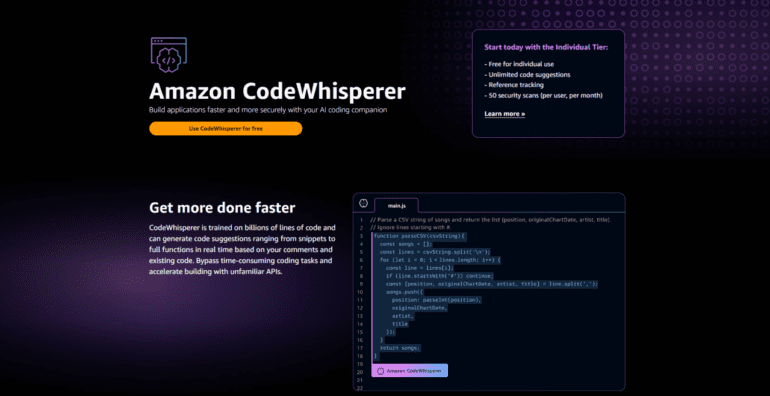TL;DR:
- Amazon announces significant enhancements to its code-generating tool, CodeWhisperer.
- CodeWhisperer now offers improved code recommendations for MongoDB app development, aligning with best practices.
- AWS collaborated with MongoDB to refine CodeWhisperer’s AI model, incorporating curated content from various programming languages.
- This partnership strengthens Amazon’s position in the code generation space and raises questions about potential future collaborations with other vendors.
- Legal considerations regarding code generation and copyright violations persist, with Amazon’s move potentially serving as a preventive measure.
Main AI News:
In the realm of AI-powered code-generating tools, the choices are abundant, ranging from open-source options to cloud-hosted solutions. But the question remains: how does one make the right choice? Distinguishing one code-generating tool from another can be a subtle endeavor, as they often share similar capabilities.
However, Amazon is poised to disrupt this landscape. Today, the company unveils significant improvements to its code-generating tool, Amazon CodeWhisperer, available through AWS. These enhancements are specifically tailored to offer superior code recommendations for MongoDB application development, the open-source database management program. With this upgrade, CodeWhisperer empowers developers to prototype more efficiently by providing MongoDB-related code suggestions that align with best practices.
Deepak Singh, VP of next-gen developer experience at AWS, highlighted the significance of this development. “Regardless of the application a developer is building, they can now access generative AI-powered code suggestions that adhere to MongoDB best practices,” he stated. “Our joint customers will benefit from optimized suggestions across both AWS and MongoDB, accelerating development for highly scalable, cloud-based applications.”
To refine CodeWhisperer’s MongoDB-related suggestions, AWS collaborated closely with MongoDB, the company behind the database. The collaborative effort involved training CodeWhisperer’s AI model on meticulously curated content and code spanning languages such as C#, Go, Java, JavaScript, and Python. The training data was drawn from MongoDB documentation, use cases, and common MongoDB tasks, with active involvement from the MongoDB team in evaluating CodeWhisperer’s output during the training phase.
Andrew Davidson, SVP of product at MongoDB, expressed excitement about the progress made. “Training AI-powered coding tools is an iterative process, and we’re thrilled with the results thus far,” he noted. “We’ll continue working with the Amazon CodeWhisperer team to further enhance performance and accuracy, providing an even more exceptional experience for developers building applications with MongoDB Atlas on AWS.”
This collaboration between Amazon and MongoDB builds on their longstanding partnership, dating back to the launch of MongoDB Atlas, a fully managed MongoDB service on AWS approximately seven years ago. While this partnership was not unexpected, it raises intriguing questions about potential future collaborations and optimizations for CodeWhisperer with other vendors. Speculation lingers about financial arrangements, but both AWS and MongoDB deny any monetary exchange in this instance.
Additionally, legal implications loom large in the code generation landscape. Microsoft, GitHub, and OpenAI currently face a class action lawsuit, alleging copyright violations due to Copilot, GitHub’s code-generating tool, reproducing licensed code snippets without proper attribution. Amazon’s collaboration with MongoDB might serve as a proactive move to prevent similar legal entanglements.
In the wake of these developments, one must ponder whether competitors like GitHub will forge their own vendor partnerships in response to Amazon’s CodeWhisperer improvements. Amazon clearly sees the MongoDB integration as a unique selling proposition, complementing its array of MongoDB products.
Despite reports of Copilot being a financial loss, it boasts a strong user base, with over a million paying individual customers and more than 37,000 enterprise clients. Nevertheless, the generative AI space is no stranger to unexpected shifts, be they driven by lawsuits, heightened competition, or other unforeseen factors.
Conclusion:
Amazon’s strategic enhancement of CodeWhisperer for MongoDB developers demonstrates its commitment to offering tailored solutions in the competitive AI-powered code generation market. This collaboration not only strengthens Amazon’s position but also raises questions about potential partnerships and legal considerations that could reshape the landscape for code-generating tools. Market players must stay vigilant in responding to these developments and consider similar strategic collaborations to remain competitive.

